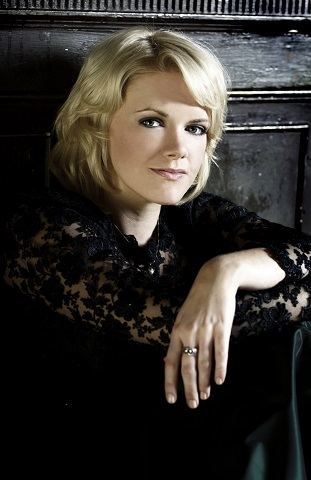The dark clouds of WWI made their presence felt: this was a conflict that
ended the expressive creativity of so many English poets and musicians,
sending some to their deaths at Gallipoli (William Denis Browne) and others
to the lingering ‘death’ of mental ill health (Ivor Gurney). It is no
wonder that composers seemingly sought to ‘escape’ through art; nor that
such expressive ‘retreats’ sometimes proved elusive, bitter, ironic or
disenchanting.
Kathryn Rudge, a BBC Radio 3 New Generation Artist, demonstrated her
ability to capture both the hope and the resignation that so many of these
songs display. Always sincere and direct - although sometimes the text was
less than clearly declaimed - Rudge exhibited a firm mezzo-soprano which is
well-centred, secure and consistent across the register: rich at the bottom
and glossy the top, but occasionally a little sturdy. James
Baillieu showed why he is the heir apparent to such luminaries of the world
of ‘accompanists’ (an unforgivably insufficient term!) as Graham Johnson,
Malcolm Martineau, Julius Drake … even with the piano lid fully raised
Baillieu never once over-powered his soloist, yet there was not a gesture
that was not defined with crystalline eloquence and when he took the
opportunity to indulge in powerful expressive utterance, it was always with
the utmost taste and composure.
Herbert Howells’ ‘Come Sing and Dance’ opened the programme, establishing a
link to the past: the text comes from folk sources, an old carol, and Rudge
displayed a sure sense of line which conveyed the confidence and assurance
of times past. The mezzo’s vibrato was quite wide but also controlled, and
she was alert to the nuanced harmonic twists and turns. Later, Howells’ Peacock Pie - settings of Walter de la Mare - took us to more
ambiguous territory. The sparse irony of ‘Tired Tim’, the humorous bite of
‘Alas, alack!’ - Baillieu’s pinching accents embodied the spluttering fat
of the ‘fish that talks in the frying pan’ - and the balladeer’s fluency of
‘Mrs MacQueen’ placed de la Mare’s apparent naïve simplicity under the
spotlight of war’s acerbity.
‘The dunce’ lurched with delicious asymmetry; Baillieu maintained a teasing
balance between regularity and stagger in the left hand, while the right
hand picked out, with ironic snatches of brilliant precision, an acidic
complement to the vocal line. The accompaniment of ‘Full moon’ sparkled
with flashes of celestial gleam, a delightful complement to the drowsy
loops of the voice.
Ivor Gurney’s ‘Sleep’ is probably the best-known of the five songs written
to Elizabethan texts that the then undergraduate penned in 1914. I loved
the hint of rubato in the piano introduction - as if the singer was rousing
him/herself from torpor - and Rudge’s communicative colours made the
sentiments tell, though I felt that she did not always craft the arching
lines with absolute fluency, breathing where I would have wished for
continuity. Gurney’s ‘Most Holy Night’, written when the composer was being
treated in a mental asylum, was powerfully eloquent, though at times the
words were lost. A slow tempo was adopted for ‘By a bierside’ but this gave
the song a poignant gravitas. The concluding episode - an effulgent
expansion and release for the piano, followed by major/minor nuances, and
harmonic sequences leading to final plunging gestures - was unsettlingly
stirring.
Three Roger Quilter’s songs permitted a gentle English whimsy to penetrate
the Wigmore Hall. ‘Go, lovely rose’ confirmed Baillieu’s delicate vocalism
- the ‘playout’ was seductively tender. ‘Now sleeps the crimson petal’
demonstrated Rudge’s consistency across registers: ‘The fire-fly wakens’
gleamed and glistened vibrantly; and the plea, ‘waken thou with me’, was
penetrating and pointed.
In William Denis Browne’s ‘To Gratiana dancing and singing’, Rudge might
have employed a more flamboyant, joyous rhetoric; but the final stanza was
tellingly recounted, not least because Baillieu’s intently deliberated
right hand, doubling the voice, was effectively deployed against deep bass
chords and ripples.
The recital concluded with Frank Bridge’s ‘Three songs with viola’ of
1903-06. Guy Pomeroy has a beautifully relaxed and characterful tone, but
he still could not always project through the busy accompaniment and
well-defined vocal lines of ‘Far, far from each other’ (Matthew Arnold),
although he did capture the roving, improvisatory air of the viola’s
explorations, as the stringed instrument wrapped itself around the vocal
line, slipped below and rose again with brightness.
In ‘Where is it that our soul doth go?’ Pomeroy offered both an embodiment
of the voice’s anxiety and an, albeit ambiguous, response to its dilemmas.
‘Music, when soft voices die’ saw the viola, fittingly, take a more
assertive role. The strumming assurance of the final tierce de Picardie was
consoling.
Claire Seymour
Kathryn Rudge (mezzo-soprano), James Baillieu (piano), Guy Pomeroy (viola)
Herbert Howells: ‘Come sing and dance’; Roger Quilter: ‘Go, lovely Rose’
Op.24 No.3 . ‘Now sleeps the crimson petal’ Op.3 No.2, ‘Music, when soft
voices die’ Op.25 No.5; William Denis Browne - ‘To Gratiana dancing and
singing’; Herbert Howells - Peacock Pie; Ivor Gurney - ‘Sleep’,
‘Most Holy Night’, ‘The fields are full’, ‘By a Bierside’; Frank Bridge -
‘Three songs for voice, viola and piano.
Wigmore Hall, London; 13
th February 2017.
